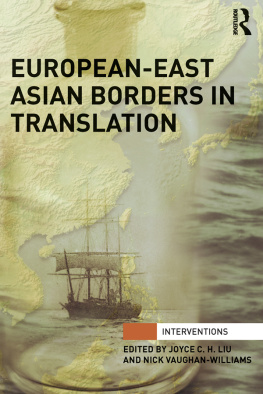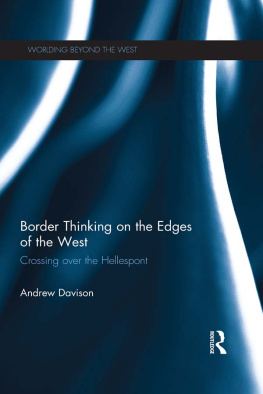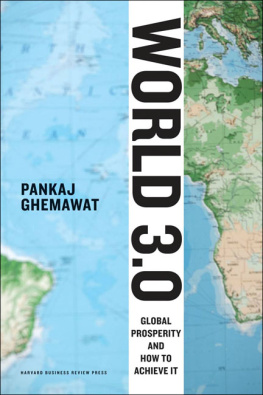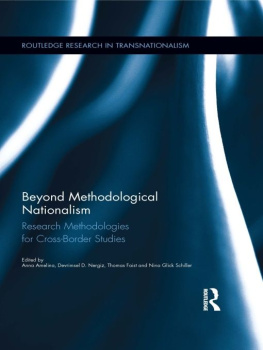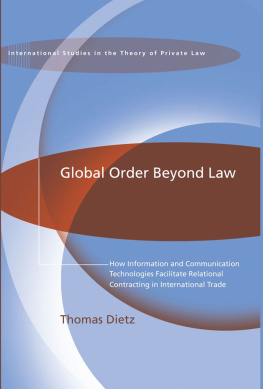Most of us do not need much persuading that the world is still round, but Pankaj Ghemawat redefines its circularity. He shows how companies can benefit from what he calls semiglobalization, while not falling into the traps unwittingly set by those who talk glibly about our globalized world.
Sir Howard Davies, Chairman, Royal Bank of Scotland
An impeccably researched reassessment of the global business worldnot as an ideal but as it really is.
Sir Martin Sorrell, CEO, WPP Group
Now things are clear. Nations and cultures will continue challenging the babel-like perspectives of those who see an irresistibly globalizing world. Pankaj Ghemawats refreshing and thought-provoking book brings us to the real world.
Michel Camdessus, former Managing Director, International Monetary Fund
Redefining Global Strategy
Redefining Global Strategy
Crossing Borders in a World Where Differences Still Matter
Pankaj Ghemawat
HARVARD BUSINESS REVIEW PRESS
BOSTON, MASSACHUSETTS
HBR Press Quantity Sales Discounts
Harvard Business Review Press titles are available at significant quantity discounts when purchased in bulk for client gifts, sales promotions, and premiums. Special editions, including books with corporate logos, customized covers, and letters from the company or CEO printed in the front matter, as well as excerpts of existing books, can also be created in large quantities for special needs.
For details and discount information for both print and ebook formats, contact .
Copyright 2018 Harvard Business School Publishing Corporation
All rights reserved
Printed in the United States of America
10 9 8 7 6 5 4 3 2 1
No part of this publication may be reproduced, stored in or introduced into a retrieval system, or transmitted, in any form, or by any means (electronic, mechanical, photocopying, recording, or otherwise), without the prior permission of the publisher. Requests for permission should be directed to , or mailed to Permissions, Harvard Business School Publishing, 60 Harvard Way, Boston, Massachusetts 02163.
The web addresses referenced in this book were live and correct at the time of the books publication but may be subject to change.
Library of Congress Cataloging-in-Publication Data
Names: Ghemawat, Pankaj, author.
Title: Redefining global strategy : crossing borders in a world where differences still matter / by Pankaj Ghemawat.
Description: Boston, Massachusetts : Harvard Business Review Press, [2018] | With a new prefaceTitle page. | Includes bibliographical references and index.
Identifiers: LCCN 2017051986 | ISBN 9781633696068 (hardcover : alk. paper)
Subjects: LCSH: International business enterprisesManagement. | Strategic planning. | Intercultural communication.
Classification: LCC HD62.4 .G474 2018 | DDC 658.4/012dc23 LC record available at https://lccn.loc.gov/2017051986
The paper used in this publication meets the requirements of the American National Standard for Permanence of Paper for Publications and Documents in Libraries and Archives Z39.48-1992.
ISBN: 978-1-63369-606-8
eISBN: 978-1-63369-607-5
To Anuradha
Who has helped me understand that globalization does not mean forgetting where Im from
Contents
Foreword
I FIRST MET Pankaj Ghemawat in September 1978, when I was looking for a very talented undergraduate to help develop a course for the then-nascent Harvard Negotiation Project. Ghemawat stood out on account of his international orientation as well as his intellectual gifts and curiosity. Working with him for a year confirmed my initial sense that he would go on to do great things.
I watched with interest as Ghemawat sped through his undergraduate and PhD degrees at Harvard in a total of six years. I was pleased when he decided to go consult after receiving his PhD. And I was delighted when he was recruited by Michael Porter to join the Harvard Business School faculty at age twenty-three. He went on to become the youngest professor ever granted tenure at Harvard Business School, on the strength of a body of distinguished work on sustainability and competitive dynamics, particularly Commitment, which is my favorite book of his. Or was, until this one.
Redefining Global Strategy is based on a decade of immersion in the strategies of global enterprises. This research has already resulted in a stream of articles in the Harvard Business Review, of which the two most recent are Regional Strategies for Global Leadership (December 2005), which received HBRs award for the best article published that year, and Managing Differences: The Central Challenge in Global Strategy, which was published as the lead article in March 2007. But it is only in this book that Ghemawat fully elaborates and explores the implications of his core proposition: that frontiers matter. Our age, he says, is not one of completeor even near-completeglobalization. Rather, the state of the world is more appropriately characterized as semiglobalization.
Ghemawats notion of semiglobalization contradicts the current fanfare about frontiers subsiding and creating a flat world in which people find both work and opportunity without being constrained by their location. For Thomas Friedman, the most prominent purveyor of this view, flatness is forced primarily by technology. For Ted Levitt, writing more than twenty years before Friedman, it was the result of a demand-side force, the convergence of tastes. And then there are other variants on this broad vision. But they all naturally lead to an emphasis on size, and on one-size-fits-all strategies.
Ghemawat is not persuaded. I imagine him, like Galileo Galilei before the Inquisition, unable to keep from saying, But it does move around the sun! In other words, a flat world may be rhetorically appealing to some, but extensive empirical observation and analysis suggest that cultural, political, and geographic barriers between countries still loom largeand have a major influence on global strategy.
If Ghemawat stopped there, he would simply have reminded us that the world is a complex place and that strategic leadership is difficult. But he is interested in providing actionable knowledge about global strategies that actually work. So Redefining Global Strategy gives the reader coherent, powerful frameworks for thinking about the ways in which borders matter and for evaluating cross-border moves. And perhaps even more importantly, it develops an array of strategies for dealing with such differencesstrategies that go well beyond one-size-fits-all.
This array of strategies is particularly appealing to me because in twenty years as a strategy consultant, I have seen many companies fail precisely because they forgot the distinction between size and strategy. However, strategy, which was invented both as a word and as a discipline in the battles of Marathon and Salamis between the Persians and the Greeks, is the art and science of overcoming the advantage of size. Strategy is meant to allow for victory of the small over the large, and the few over the many, at least sometimes.
Ghemawats concept of semiglobalization not only fits with this broad view of strategy, it also gives us the tools to advance successful globalization. As the founder of the consulting firm Panthea, and as the senior executive adviser on strategic leadership to Booz Allen Hamilton, I am proud that my two firms have recognized the value of these ideas. Their initial reception by Booz Allen clients has been enthusiastic, and we expect that they will help us better understand the worldand change it for the better.
Nikos Mourkogiannis
Acknowledgments
BEHIND THIS BOOK is a personal journey from a small city in India, to Indiana, back to India, then to Cambridge, Massachusetts, and recently to Barcelona. Professionally, I began to work on the ideas in this book in the mid-1980s, soon after I had joined the Harvard Business School faculty, when I wrote an early analytical piece on global strategy with Mike Spence, one of my thesis advisers.
Next page



